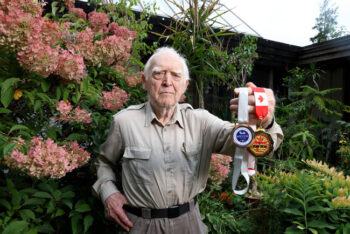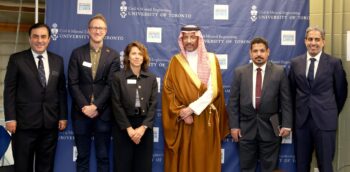Professor Seungjae Lee joined the Department of Civil & Mineral Engineering as an Assistant Professor on July 1, 2021.
Professor Lee shared his thoughts on transformative research collaboration, career highlights to date, and his top tip for students with CivMin’s Phill Snel.
Can you tell us a little about yourself?
I hold a B.S. and M.S. in Architectural Engineering from Yonsei University and PhD in Civil Engineering from Purdue University.
Before joining U of T, I was a postdoctoral research associate at Oak Ridge National Laboratory in Oak Ridge, Tenn.
Could you explain the focus of your research?
My research and teaching interests include building energy performance, indoor environmental quality, optimal design and operation of building energy systems, and human-building interaction.
In my lab, we develop scalable artificial intelligence (AI) solutions for building energy systems to improve building energy performance, occupant satisfaction, and grid reliability and resilience.
More specifically, I am interested in applying modern probabilistic machine learning and optimal control techniques to building design and control problems, as well as developing effective user interfaces and eco-feedback programs based on a holistic understanding of human-building interactions.
Why did you choose U of T Engineering?
I want to conduct transformative research, and I anticipate there will be plenty of opportunities and resources at U of T. In addition, I think the collaborative culture at U of T will be of great help to me. I look forward to collaborating with great colleagues and students to develop advanced solutions towards smart and sustainable buildings and cities with other researchers. I think there will be many interdisciplinary research opportunities related to AI techniques and human factors.
As a new professor, what one piece of advice would you give to new students?
Overcome your fear of not knowing, and do not limit yourself.
In this rapidly changing world, you will need to constantly learn new knowledge and techniques to resolve various problems you haven’t seen before. You can always find great resources and mentors online and offline these days.
What do you hope to accomplish in your new position?
I hope to build a research group conducting interdisciplinary research towards realizing occupant-centric and grid-interactive smart buildings. With the group members, I would like to propose a new paradigm for the design and operation of buildings based on the seamless integration of building domain knowledge and big data. I also hope to contribute to growing the Building Science group into a world-renowned centre for building science research.
Finally, I would like to develop new courses in which students can learn how to apply modern probabilistic machine learning and optimal control approaches to improve building energy performance and indoor environmental quality.
What is the most memorable experience in your career so far?
Before I started my PhD, I worked at a building HVAC commissioning and energy audit company for three-and-a-half years. I observed various problems in different buildings and realized that optimizing each individual building is challenging for human engineers because of the heterogeneity between different buildings and various uncertainties.
Based on the experience, I decided to develop intelligent systems that can optimize individual buildings autonomously and started my PhD.
Is there anything else you’d like to share?
I used to play the electric guitar.



